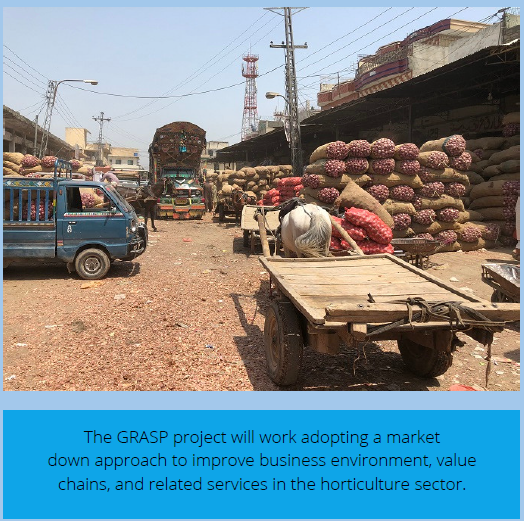Growth for Rural Advancement and Sustainable Progress (GRASP)

Duration: July 2019 – December 2024
Budget: € 48 million
Location: Federal, Sindh & Balochistan
Implementing Partners: International Trade Center (ITC)
GRASP is a six-year project, designed to reduce poverty in Pakistan by strengthening small and medium-sized enterprises (SMEs) and small-scale agribusinesses in the provinces of Balochistan and Sindh. The project will help SMEs in the sectors of horticulture and livestock to become more competitive, inclusive, and climate resilient by making improvements at all levels of the value chain.
The challenge
Livestock and horticulture sectors account for 70% of value-added agriculture and have particularly strong growth potential due to rising demand by a growing population. However, the SMEs in these two sectors face major challenges related to business environment, value chains, productivity and services including access to finance, market information and agribusiness services. By improving product quality at every stage, from planting to production, to packaging and transport, SMEs will be able to increase their productivity and profitability.
How do we address the challenge?
GRASP action in general ranges from market to farmer. In other words, it focuses on what markets, buyers and consumers want, then equips the SMEs trading with them with the skills, technology and services needed to meet that demand. By ensuring that SMEs are well equipped to increase their overall productivity, a sustainable and inclusive contribution to driving Pakistan’s economic growth will be made.
The programme focuses on development of targeted SMEs clusters, by fostering value addition along the whole supply chain. The increased integration of small producers into supply chains will lead to enhanced income generating opportunities for the SMEs. This overall value addition will allow transformation of the rural economy, particularly in the provinces of Balochistan and Sindh. The GRASP programme will contribute to the creation of a productive business environment and facilitate the establishment and development of profitable SMEs around selected value chains.
Support to policy
The government is committed to support fast rural economic transformation through rural reforms, and skills development programmes to support rural enterprises. Aligned with these priorities, the GRASP project will unlock the diversification and potential in livestock and horticulture sectors. It will lead to an improvement in business environment, selected agriculture value chains, productivity, climate resilience and agribusiness services and create job opportunities. Gender mainstreaming is a cross-cutting priority of the GRASP project.
EU in Pakistan
The European Union (EU) funds projects and programmes around the world in order to help addressing global and local challenges. The reduction of poverty and the respect of fundamental rights and freedoms are key objectives in this context. In Pakistan, the EU is committed to a stable, democratic and pluralistic country that respects human rights and benefits from its full economic potential by supporting sustainable and inclusive development for all its citizens. The EU provides Pakistan with about €100 million annually in grants for development and cooperation. Among other issues, the EU supports Pakistan in its efforts to tackle poverty, increase education, promote good governance, human rights, rule of law and ensure sustainable management of natural resources. EU-funded projects are covering all of Pakistan with a special focus on Sindh and Balochistan.
The collaboration between the European Union and Pakistan is grounded in the Strategic Engagement Plan (SEP) signed in 2019. Areas of cooperation under the SEP include peace and security, democracy, rule of law, human rights, and migration but also sectors such as energy, climate change and science and technology.
The EU is one of Pakistan’s largest trading partners. The EU supports Pakistan’s integration into the world economy and its sustainable economic development, namely by granting it preferential access to the European single market under the GSP+ system since 2014. Under this scheme almost 80% of Pakistan’s exports enter the EU duty and quota free. In 2018, Pakistani exports to the EU were worth €6.9 billion.
In order to enjoy the trade preferences under GSP+, Pakistan needs to demonstrate progress on the implementation of 27 international conventions on human rights, good governance, labour rights and environmental protection.
Delegation of the European Union to Pakistan,
House 9, Street 88, G-6/3, Islamabad
Phone: +92 51 227 1828, Fax: +92 51 282 2604
Email: [email protected]
To report any irregularities contact us on [email protected]





